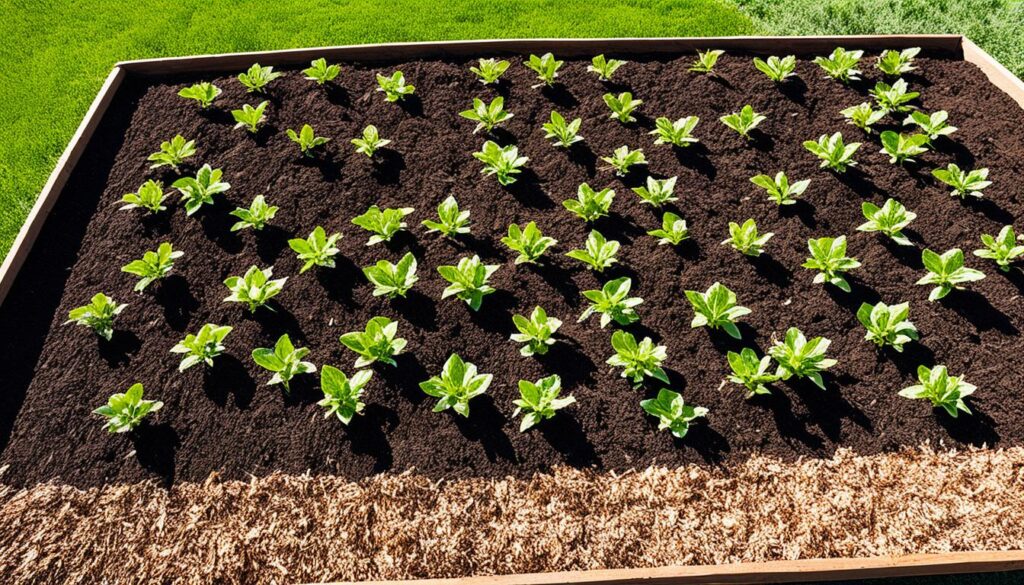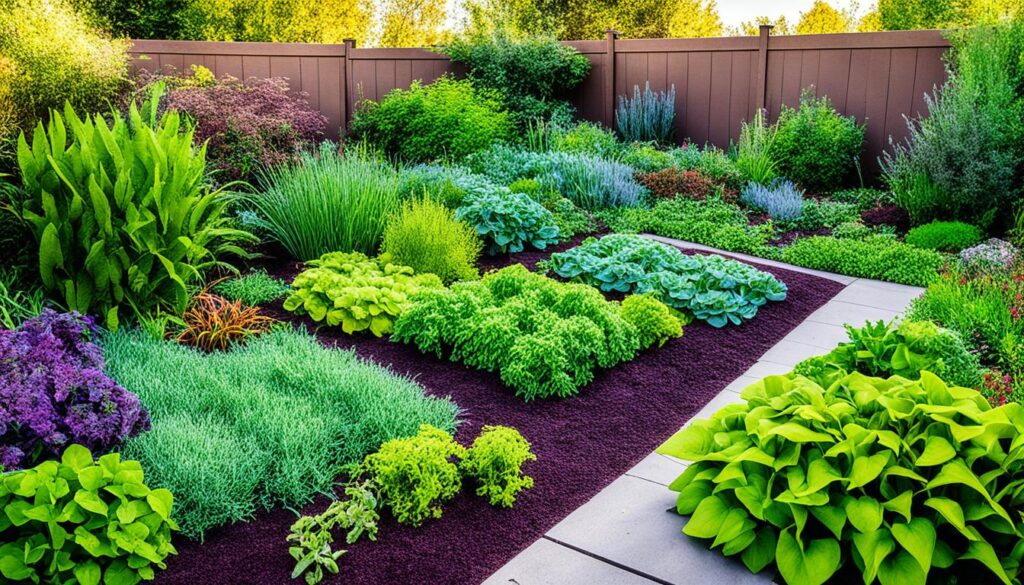Organic Weed Control: Natural Methods for a Weed-Free Garden
Are you tired of fighting weeds in your garden? There’s hope! With organic methods, you can control weeds and have a beautiful garden. We’ll show you natural ways to make your garden weed-free.
Weeds might seem bad, but they’re actually good for your garden. They help with soil health and attract good insects. This balance is key for a healthy garden.
We’ll share the best ways to stop weeds and keep your garden looking great. Learn about timing, identifying weeds, and using no-till farming and mulching. These methods help you have a garden without chemicals.
Ready to use organic weed control and make your dream garden? Let’s start and learn how to keep your garden weed-free and thriving!
Key Takeaways
- Discover the hidden benefits of weeds and how to harness them for your garden’s benefit.
- Learn effective strategies for preventing weed growth, including timing, identification, and innovative techniques.
- Explore natural, organic methods for controlling weeds, such as mulching, cultivation, and targeted organic treatments.
- Understand the importance of protecting soil health and how it can contribute to a weed-free garden.
- Gain the knowledge and confidence to create a sustainable, thriving outdoor space without relying on harmful chemicals.
Understanding Weeds: A Shift in Perspective
Exploring organic weed control means changing how we see weeds. Some weeds can be a problem, but many have great benefits. They help the soil, feed pollinators, and are part of the garden’s balance.
Learning about different weeds helps you decide which to keep or remove. This approach makes gardening more sustainable and balanced.
The Benefits of Weeds
Weeds can be good for your garden. Many are edible and add nutrition to your meals. Purslane is full of omega-3 fatty acids, vitamins, and antioxidants.
Dandelions are rich in vitamins A, C, and K, plus iron and calcium. Embracing these weeds means less waste and a more diverse garden.
Gaining Respect for Weeds
Respecting nature and managing weeds well means understanding them. Knowing the weeds in your garden helps you decide which to keep or remove. This knowledge lets you work with weeds, not against them.
On your journey to control weeds organically, see weeds as part of the garden, not just unwanted plants. They play a key role in the ecosystem. By valuing weeds, we can create a garden that works with nature.
Preventing Weed Growth: The Importance of Timing
Keeping your garden weed-free is a constant challenge. But, timing is everything. To prevent weeds, you must act before they can spread. This means stopping them from seeding early on. By doing so, you can break the weed cycle and keep your garden healthy with organic practices.
Getting to the Weeds Before They Seed
Removing weeds before they seed is key to stopping their growth. This means watching your garden closely and pulling weeds regularly. It’s a vital step to keep your garden weed-free without harsh chemicals. By controlling weeds early, you’ll reduce the number of seeds in your soil, making future control easier.
Identifying Weeds: Knowledge is Power
Knowing which weeds you have is crucial for controlling them organically. Different weeds need different treatments, and some can even be beneficial. Learn the names and traits of your garden weeds through online resources, local offices, or field guides. This knowledge lets you decide which weeds to remove and how to manage them. Understanding your weeds is a key part of a sustainable, organic garden.
“If you allow weeds to mature and drop their seeds, you’ll be dealing with the consequences for years to come, as the weed seed bank in your soil will continue to germinate.”
No-Till Approach: Protecting Soil Health
Avoiding tillage is key to controlling weeds organically in your garden. Tillage can harm the soil’s microbial systems and structure. This leads to compaction, low organic matter, and weed seeds germinating. By choosing no-till gardening, you stop millions of weed seeds from growing.
Using no-till practices keeps your soil healthy and supports organic gardening. This method creates a strong, eco-friendly ecosystem in your garden.
| Benefits of No-Till Gardening | Drawbacks of Tillage |
|---|---|
|
|
Choosing no-till gardening helps protect your soil’s balance. It makes your garden thrive and follow organic and sustainable gardening principles.
“Healthy soil is the foundation for successful, sustainable gardening. By avoiding tillage, we can nurture the soil’s natural processes and create an environment that is inhospitable to weeds while promoting the growth of our desired plants.”
Mulching: A Powerful Weed Suppression Technique
Putting a thick layer of organic mulch is a top way to stop weeds in your garden. Mulch acts as a barrier, blocking light and stopping weed seeds from growing. As it breaks down, it also makes your garden soil healthier and more fertile.
Types of Organic Mulches
Some top organic mulch choices for fighting weeds and improving soil are:
- Shredded leaves
- Straw
- Wood chips
- Compost
These natural materials not only kill weeds but also keep soil moist and add important organic stuff to your garden.
Tips for Effective Mulching
To get the most out of organic mulches, follow these important tips:
- Put the mulch on early in the season, before weed seeds can start growing.
- Clear out any weeds before putting on the mulch, as it won’t kill plants that are already there.
- Use a thick layer, about 2-3 inches, to block sunlight and stop weeds from growing.
- Don’t use dyed or treated mulches, or straw that might have weed seeds.
By doing these things, you can make a strong, lasting mulch barrier. This will help keep your garden weed-free and your soil healthy and thriving.
“Mulching is a game-changer for your garden. It’s an effortless way to suppress weeds and nourish your soil at the same time.”
Organic Weed Control: Natural Methods for a Weed-Free Garden
Keeping your garden weed-free doesn’t need harsh chemicals. Using organic weed control methods, you can keep your garden healthy and weed-free. This approach uses many strategies to manage weeds.
Mulching is a strong way to control weeds. Organic mulches like wood chips or straw block light and stop weeds from growing. They also help keep the soil healthy and moist, which is good for sustainable gardening.
Paper mulches, such as cardboard, are another good option. They smother weeds and add organic matter to the soil as they break down. This method helps control weeds and improves your garden maintenance work.
Cultivation and topping are also effective. Loosening the soil harms weed roots, and cutting off weed flowers stops them from spreading.
For tough weeds, try tarping or flame weeding. Tarping cuts off light and oxygen, killing weeds. Flame weeding burns weeds without hurting the soil.
Using these natural weed prevention methods keeps your garden weed-free and healthy. Stay proactive and committed to sustainable gardening for a beautiful garden.
Paper Mulches: Layering for Success
Organic gardeners use paper mulches to keep their gardens weed-free. They put cardboard or thick builder’s paper on the soil, then add organic mulch on top. This creates a strong barrier that stops weeds from growing.
Using Cardboard and Builder’s Paper
The paper slowly breaks down, adding nutrients to the soil. At the same time, the organic mulch keeps the area weed-free. This method, known as “sheet mulching,” is great for starting new beds or improving old ones. Using paper mulches boosts your organic gardening efforts and helps you have a lush, weed-suppressed garden.
- Cardboard effectively blocks light and suppresses weed growth.
- Builder’s paper, with its added thickness, offers even more weed suppression power.
- The paper materials gradually decompose, enriching the soil with valuable nutrients.
- Topping the paper layer with organic mulches maintains the weed-free environment.
Try layering paper mulches in your organic gardening to see amazing results. Enjoy a beautiful, weed-free garden oasis.

“Paper mulches provide a dual benefit – they suppress weeds while also improving soil health as they break down over time.”
Cultivation and Topping: Old-School Techniques
Modern organic gardening methods work great, but old-school techniques are also useful. Careful cultivation of the soil helps remove young weed seedlings before they spread.
Tools like hoes and scuffles can disrupt weeds by loosening the soil. This exposes their roots to the sun and air. This simple method works well with other organic strategies like mulching and watching for weed seeds.
Topping, or cutting off weed flowers and seed heads, is another traditional method. It stops them from dropping seeds, reducing the weed seed bank in your garden. This makes it harder for weeds to grow back.
- Carefully cultivate the soil to remove young weed seedlings
- Use tools like hoes and scuffles to disrupt weeds
- Cut off weed flowers and seed heads before they drop seeds (topping)
Using these old-school methods with other organic weed control strategies keeps your garden healthy. You won’t need synthetic chemicals. The goal is to create a weed-free garden oasis.
Additional Organic Weed Control Strategies
Keeping your garden weed-free is key to a healthy garden. Exploring different organic weed control methods is essential. Compost monitoring and tarping for persistent weeds are two effective strategies.
Compost Monitoring
When using homemade compost in your garden, watch it closely. Don’t add weeds that have seeds, as they might not get killed by the compost heat. Turning and checking the compost pile often ensures it gets hot enough to kill weed seeds. This way, you can use the compost safely without spreading weeds.
Tarping for Persistent Weeds
Tarping is great for tough, perennial weeds. Cut the weeds down, then cover the area with a dark tarp and secure it. This method blocks light and oxygen, slowly killing the roots over time. Though it should be used carefully, as it affects soil life too, tarping can effectively get rid of weeds in your garden.
Flame Weeding
Flame weeding uses a propane torch to kill weeds. The heat bursts the plant cells, killing them off, especially annual weeds and those in cracks or along fences. It’s a spot treatment that’s fun and chemical-free. But, be careful not to harm the plants you want to keep.

Adding these organic weed control methods to your garden care can keep your garden weed-free and healthy.
Conclusion
Using a mix of organic weed control methods, you can keep your garden weed-free without harmful chemicals. This guide has shown you how to prevent weeds and use techniques like mulching and cultivation. You now have the tools and knowledge to take back your outdoor space.
Choosing a sustainable way to manage weeds helps your garden be healthy and productive. It also supports a balanced ecosystem. With patience and persistence, you can have a garden that’s beautiful and weed-free. Using organic methods makes your garden look great and helps the environment too.
On your path to a weed-free garden, remember that organic weed control is ongoing. You need to watch your garden closely and try different methods. With this guide, you’re ready to keep your garden looking great with organic weed control, sustainable gardening, and garden maintenance.
FAQ
What are the benefits of weeds in the garden?
How can I prevent weeds from going to seed in my garden?
Why is identifying weeds important for organic weed control?
How does a no-till approach benefit my garden’s weed control?
What are the best organic mulch options for weed control?
How can paper-based materials help control weeds in my garden?
What are some old-school techniques that can help control weeds organically?
How can I prevent weed seeds from being introduced through homemade compost?
When is tarping an effective organic control method for persistent weeds?
How can flame weeding be used as an organic weed control technique?
Source Links
- https://www.heirloomsoul.com/blog/how-to-suppress-weeds-organically-without-chemicals – Methods for Organic Weed Control — Heirloom Soul Florals
- https://savvygardening.com/organic-weed-control-tips/ – Organic weed control tips for gardeners
- https://www.theprairiehomestead.com/2019/07/natural-weed-control.html – Natural Weed Control for Your Garden • The Prairie Homestead
- 10 Must-Have Blooms for Your 2025 Garden
- The Health Advantages of Gardening You Need to Know
- How to Create a Small Vegetable Garden Layout Plan: A Beginner’s Guide
- DIY Garden Projects for Small Spaces: Upcycling Ideas to Maximize Your Garden
- Watering Techniques for Small Gardens: Ensuring Your Plants Thrive
- Small Border Plants for Landscaping: Adding Beauty and Functionality to Your Garden
- Year-Round Small Space Gardening: Seasonal Planting Tips for Maximum Harvest
- Essential Tools for Small-Space Gardening: What You Really Need
- The Ultimate Guide to Container Vegetables: What to Grow in Small Spaces
- Budget-Friendly Gardening: How to Create a Thriving Garden on a Tight Budget
- How to Optimize Sunlight in Small Gardens: Tips for Better Plant Growth
- DIY Vertical Planters: Creative Ideas for Small Space Gardening
- Companion Planting for Small Vegetable Gardens: Boost Growth and Deter Pests
- Container Gardening Essentials: Choosing the Right Pots, Soil, and Plants
- Vertical Gardening Techniques: Maximizing Your Small Space with Climbers and Vines
- How to Build a Raised Bed Garden in a Small Backyard: Step-by-Step Guide
- The Best Vegetables for Small-Space Gardens: High-Yield Varieties You Need to Grow
- Smart Vegetable Garden Layouts for Small Spaces: Maximizing Your Green Thumb in Compact Areas
- 40. Best Practices for Managing a Sustainable Garden Year-Round
- Building a Wildlife Pond for Biodiversity
- Advanced Techniques in Sustainable Gardening
- How to Create a No-Till Garden
- The Mental Health Benefits of Gardening
- Using Technology to Enhance Sustainable Gardening
- Getting Certified Organic: Steps and Benefits

Leave a Reply